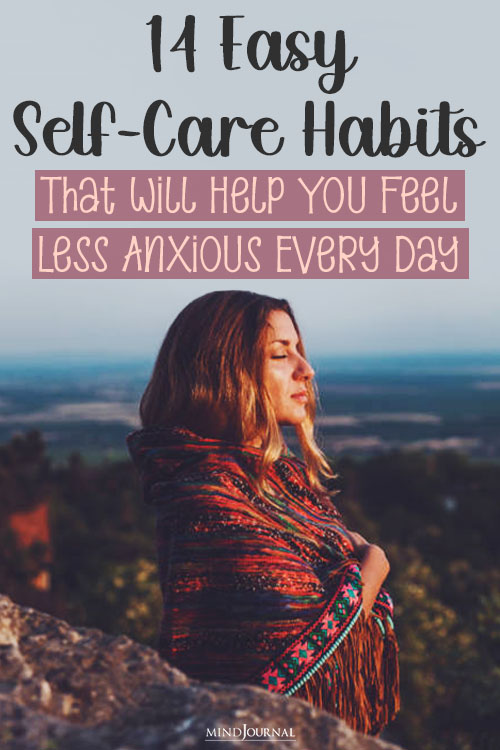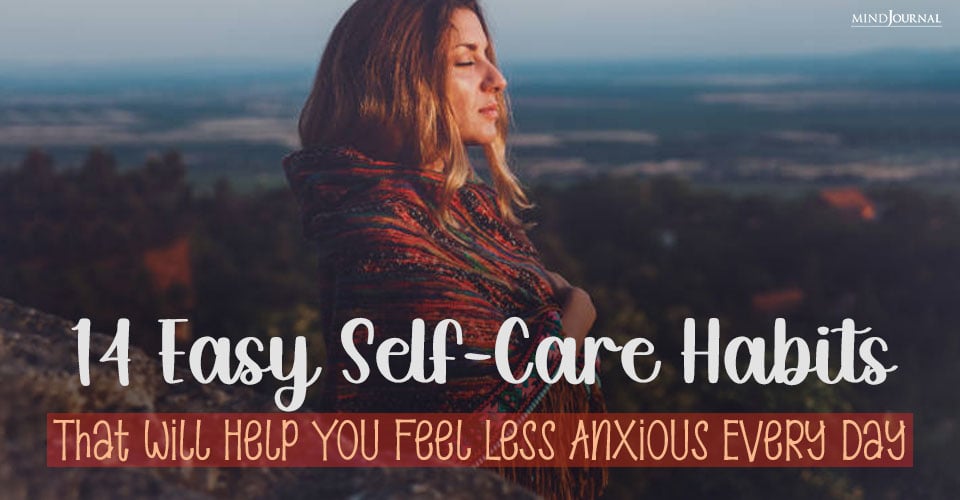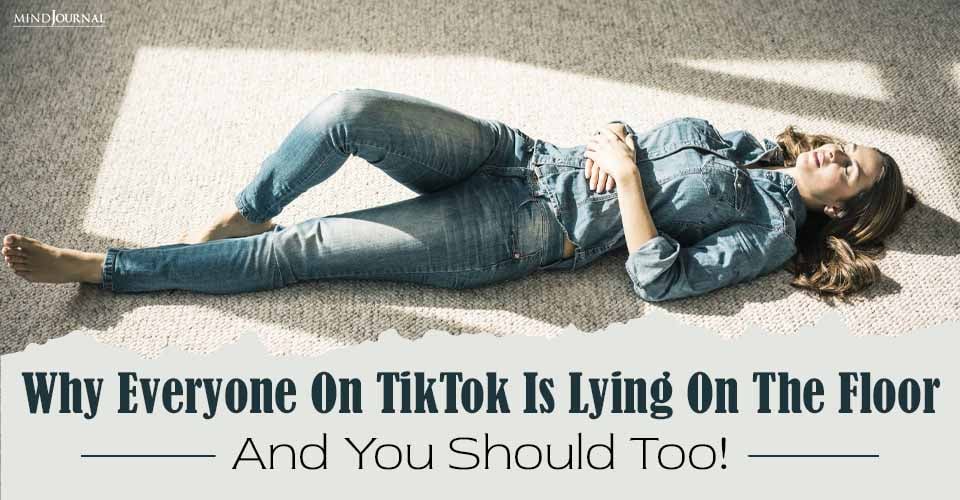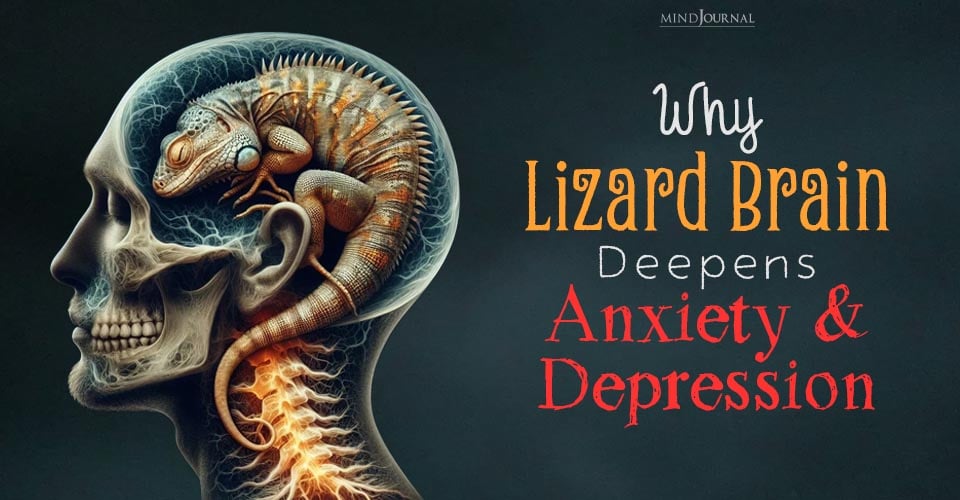Self-care habits can feel like a luxury when you’re overwhelmed with anxiety. When your mind is racing and your heart feels heavy, the idea of adding “one more thing” to your day may seem impossible. I get it—when you’re anxious, even simple tasks can feel exhausting. But, in reality, small, easy self-care habits can make a huge difference.
I wasn’t always a believer. For the longest time, I thought squeezing in a few extra minutes of sleep was the best thing I could do for myself. And while rest is important, I realized that how I start my day affects everything else. The days I take a little time to care for myself, I feel more grounded, calm, and capable. The days I don’t? My anxiety feels louder and harder to manage.
In this article, you’ll find simple self-care habits that are easy to do and genuinely work.
Read More: 10 Liberating Ways to Heal Your Shame
14 Simple Self-Care Habits To Help You Feel Less Anxious
1. Breathe Slowly and Deeply
When anxiety hits, your breathing speeds up. Slow it down. Take a deep breath in through your nose, hold it for a few seconds, and breathe out slowly through your mouth. This simple habit calms your nervous system and helps you feel more relaxed. Just a few deep breaths can work wonders.
2. Move Your Body
You don’t need an intense workout. Gentle movement like stretching, walking, or dancing can release built-up tension. Moving your body increases feel-good chemicals in your brain. Aim for a few minutes a day. This healthy self-care habit can boost your mood and ease anxiety.
3. Practice Gratitude
When anxiety clouds your mind, shift your focus. Each day, write down three things you’re grateful for. They don’t have to be big – a sunny day, a kind word, or a warm cup of tea. Practicing gratitude trains your brain to see the positive, making it a powerful anxiety self-care habit.
4. Limit Screen Time
Too much screen time can overstimulate your mind. Take breaks. Spend time away from your phone, especially before bed. Try reading a book, journaling, or enjoying quiet moments. This simple self-care habit can give your mind the rest it needs to feel calm.
5. Get Enough Sleep
Sleep and anxiety are connected. Poor sleep can make anxiety worse, and anxiety can make it hard to sleep. Create a bedtime routine that relaxes you – dim the lights, avoid screens, and unwind with a soothing activity. Prioritizing rest is a key self-care habit to heal anxiety.
6. Connect with Someone You Trust
You don’t have to face anxiety alone. Reach out to a friend, family member, or therapist. Sharing your feelings lightens the emotional load. Connection is a powerful daily self-care habit that reminds you that you’re not alone.
7. Be Kind to Yourself
Anxiety can make you hard on yourself. Practice self-compassion. Talk to yourself the way you would comfort a friend. Remind yourself that you’re doing your best. This gentle self-care habit can bring peace and ease your worries.
Read More: How To Get Through A Bad Day: 16 Tips To Turn Things Around
8. Spend Time in Nature
Nature has a calming effect on the mind. Take a walk in the park, sit by a tree, or simply step outside and breathe fresh air. Being in nature helps lower stress and brings a sense of peace. Even a few minutes can make a difference.
9. Set Small, Manageable Goals
Big tasks can feel overwhelming. Break them down into small steps. Focus on one thing at a time. Completing even small goals gives you a sense of accomplishment and reduces feelings of anxiety.
10. Stay Hydrated
Dehydration can affect your mood and energy levels. Drink enough water throughout the day. Keeping your body hydrated supports overall well-being and can ease physical symptoms of anxiety.
11. Create a Calm Space
Your environment affects how you feel. Designate a small area where you can relax. Add soothing elements like soft lighting, a cozy blanket, or calming scents. This peaceful space can be your retreat when anxiety feels overwhelming.
12. Limit Caffeine Intake
Too much caffeine can make anxiety worse. It increases heart rate and restlessness. Try cutting back or switching to herbal teas. This small change can have a calming effect on your body and mind.
13. Do Something Creative
Creativity can be therapeutic. Draw, paint, write, or try a new hobby. Expressing yourself through creative activities can distract your mind from anxious thoughts and bring joy to your day.
14. Practice Mindfulness
Mindfulness means focusing on the present moment without judgment. Try simple mindfulness exercises like paying attention to your breathing or noticing your surroundings. This practice helps ground you and reduces racing thoughts.
Final Thoughts
Healing anxiety takes time, but small steps matter. These fourteen easy self-care habits can help you feel more balanced and less overwhelmed. You deserve kindness and care every day. Start small, be patient with yourself, and trust that you are on the path to healing.
Read More: Kind Words, Weird Feels: The Psychology of Compliments
Frequently Asked Questions (FAQs):
1. How do self-care habits help with anxiety?
Self-care habits help calm your mind, reduce stress, and improve your overall well-being. By practicing healthy self-care habits daily, you create a supportive routine that can ease anxiety over time.
Which self-care habit is the easiest to start with?
Deep breathing is one of the easiest habits to start. It takes only a few minutes and can quickly calm your nervous system. You can practice it anytime, anywhere.
Can self-care habits replace professional help for anxiety?
Self-care habits are helpful but may not replace professional help. If your anxiety feels overwhelming or persistent, reaching out to a mental health professional is a wise step toward healing.










Leave a Reply